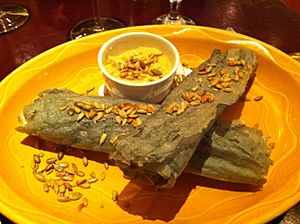Piki facts for kids

Piki Bread at a hotel restaurant in Santa Fe, New Mexico
|
|
| Type | Bread |
|---|---|
| Place of origin | United States |
| Region or state | Western United States |
| Main ingredients | Blue corn meal, ashes, water |
Piki is a special kind of bread made from blue corn meal. It is a very important food in the Hopi culture, an Native American tribe. Piki bread is known for being extremely thin and delicate.
Contents
How Piki is Made
Making Piki bread is a detailed process that takes several steps. It is often made by women and requires skill and patience.
Preparing the Corn
First, blue corn, which is a main food for the Hopi people, is ground into a very fine powder. This is done using a special grinding stone called a metate. The cornmeal needs to be as fine as flour.
Mixing the Batter
Next, the fine blue cornmeal is mixed with water. A special ingredient is also added: burnt ashes from native bushes or juniper trees. These ashes are important because they help change the corn nutritionally. This process is called nixtamalization. It makes the corn easier to digest and helps the body get more nutrients from it.
Baking Piki Bread
The thin corn batter is then spread by hand onto a large, flat baking stone. This stone has been heated over a fire until it is very hot. Before baking, the stone is coated with oil. This oil is made from pounded seeds of plants like squash and sunflower. Sometimes, oil from watermelon seeds is also used. Watermelons originally came from Africa, but they have been grown in the Americas for at least 500 years.
Piki bread bakes almost instantly on the hot stone. It cooks so fast that it can be peeled off the rock in very thin sheets. These sheets are so thin that you can almost see through them! After baking, several sheets of the bread are often rolled up loosely. They form flattened scrolls, which are easy to eat.
Cultural Importance
Making Piki bread from start to finish can take several days. It is not just a food; it also has a special place in Hopi traditions. Piki is often prepared by women for important family events and ceremonies, such as weddings. It is a symbol of community and tradition.
 | Janet Taylor Pickett |
 | Synthia Saint James |
 | Howardena Pindell |
 | Faith Ringgold |

